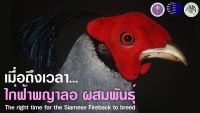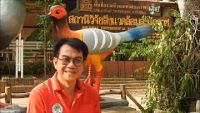Keywords :
Habituation Process; Macaca leonina; Multinomial Logit Regression; Thailand; Degraded Habitat
บทคัดย่อ :
Habituation allows an observer to closely approach and follow free-ranging animals, as they no longer respond to the observer presence (e.g., through flight, avoidance, display, curiosity). While habituation is implicitly
acknowledged as a necessary step before any direct observational studies of primates, there is very little published
data on the subject. The aim of this study is to analyse the habituation process over time (17 months) in a wildfeeding
troop of northern pigtailed macaques (Macaca leonina) inhabiting a degraded forest fragment of the Sakaerat
Biosphere Reserve, Thailand. Based on the number of encounters, contact duration with the studied troop, and behavioural responses to the observer recorded ad libitum and via scan sampling, we found statistical evidence of
habituation progress over five stages: early, minimal, partial, advanced, and full. The complete habituation process
took nearly 13 months. Factors such as the macaques limited experience of human contact, semi-terrestriality, large
ranging patterns, fission-fusion dynamics, unpredictable resource use, as well as reduced native fruit availability
in this degraded forest fragment may explain the length of the process. It was only possible to collect ranging and behavioural data from the partial habituation stage, although these data were biased toward adult males and
sub-adults, while overestimating movement behaviour over inactivity and social behaviours. Our results highlight
the importance of analysing behavioural data of fully habituated groups of primates to limit biases of observer
presence, and also of not underestimating the habituation process length. This study provides novel information
on the habituation process in macaques and proposes an effective methodology to analyse the habituation process
across a wide range of primate species.
เอกสารอ้างอิง :
Gazagne, E., Hambuckers, A., Savini, T., Poncin, P., Huynen, M. C., & Brotcorne, F. (2020c). Toward a better understanding of habituation process to human observer: A statistical approach in Macaca leonina (Primates: Cercopithecidea). Raffles Bulletin of Zoology, 68(2020), 735-749.



